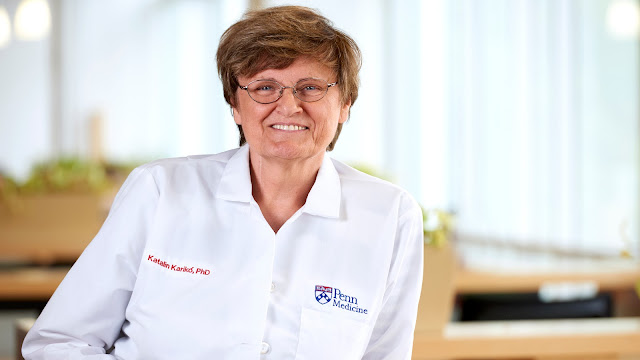New Nobel Prize in Medicine winner Katalin Karikó, launched career at USU
Dr. Katalin Karikó was awarded the Nobel Prize in Medicine on Oct. 2 for her key discoveries that led to the development of the mRNA vaccines against COVID-19.
October 4, 2023 by Sarah Marshall
A biochemist who got her start at the Uniformed Services University (USU), Dr. Katalin Karikó, was awarded the Nobel Prize in Medicine on Oct. 2 for her key discoveries that led to the development of the mRNA vaccines against COVID-19.
Karikó, currently a professor at the Szeged University in Hungary and an adjunct professor at the University of Pennsylvania, started her career at USU, serving as a postdoctoral fellow from 1985 to 1988 in the Pathology Department, where she began her work with messenger RNAs (mRNAs). The role of the mRNA is to carry instructions from the DNA to the cell in the process of making proteins, which are needed to perform many different processes needed for the body to function. Prior to her arrival in the U.S. as part of her Ph.D. work, Kariko studied the challenge of delivering these molecules to cells, safeguarding the mRNA from harmful enzymes during transit. Merely having a delivery vessel was insufficient, as the contents needed to navigate the cell's lipid bilayer, which typically repels mRNAs. Her doctoral research focused on this delivery aspect, encapsulating DNA—akin to mRNA—in lipid sacs known as liposomes.
Former Department of Pathology chair Dr. Robert Friedman hired Karikó for her post-doc work at USU. Karikó had left her native Hungary after earning her Ph.D., and had been working as a post-doc at a lab in Philadelphia, studying interferon, a protein produced by the body’s cells. The two met at a meeting, where she learned that his lab was also studying interferon using techniques in molecular biology. She left her position in Philadelphia and began working for various labs in USU’s Pathology Department, where she often slept on its library floor at night as her work continued.
“Dr. Kariko was extremely dedicated to learning molecular biology at USU, even though it created somewhat of a hardship for her and her family, who remained in Philadelphia while she worked in Bethesda. But she was very focused, and obviously it paid off,” Friedman said.
It was during her post-doctoral work at USU that she learned about lipofectin, a new lipid that could carry nucleic acids into cells. With that knowledge and a desire to return to her family, Karisko went back to Philadelphia, moving to a new lab at the University of Pennsylvania, where she later met Dr. Drew Weissman. The pair collaborated on the mRNAs research for years. In 2005, the two published a study that suggested these proteins could be altered and delivered into the body to activate the body’s immune response, including high levels of antibodies that attack an infectious disease that it has not yet encountered. Unlike other vaccines, mRNA vaccines do not require a live virus to be injected or required at any point.
Eight years later, Kariko left to work at BioNTech, a biotechnology company based in Mainz, Germany, but their collaboration continued, ultimately resulting in development of a promising vaccine against Zika virus.
When the pandemic struck in early 2020, Karikó and Weissman worked expeditiously with Pfizer/BioNTech and Moderna to develop highly effective vaccines tailored to protect against severe illness and death from the virus. Later that year, in December 2020, the first mRNA vaccines were approved for use against the virus. Since then, billions of doses have been injected throughout the world.
While the mRNA has become known more prominently lately for its use in COVID-19 vaccines, this ground-breaking technology is expected to become an important basis for future flu vaccines, allowing greater accuracy in fighting against the most current strand that’s circulating and also allowing for much shorter lead times.
“Using the knowledge she had gained at USU, her career developed to the point where it paid off in the form of a Nobel Prize,” Friedman said.
Kariko and Weissman were selected for the prestigious Nobel Prize in Medicine, which was publicly announced on Oct. 2, 2023.
"Through their groundbreaking findings, which have fundamentally changed our understanding of how mRNA interacts with our immune system, the laureates contributed to the unprecedented rate of vaccine development during one of the greatest threats to human health in modern times,” according to a release by the panel that awarded the prize.
Since 1901, the Nobel Foundation has awarded prizes to those whose breakthroughs have conferred the “greatest benefit to humankind.” Prizes are bestowed to laureates whose work relates to the areas of physics, chemistry, physiology or medicine, literature, peace, and economics. Fewer than 1,000 people have received a Nobel Prize, and only 225 have previously been awarded one in Physiology or Medicine. Karikó is also the 61st woman to ever be named a Nobel Laureate, and the 13th woman to win the Prize in Medicine. Karikó and Weissman will receive their Nobel diploma, gold medal, and $1 million prize in Stockholm during a ceremony on Dec. 10.
"Being selected for a Nobel Prize is an extraordinary honor, a testament to one's dedication and groundbreaking contributions to humanity. We are immensely proud to have played a part in Dr. Kariko's remarkable career, which has led to this well-deserved recognition,” says USU President Dr. Jonathan Woodson. “Her journey inspires us all to strive for excellence in our pursuit of knowledge and innovation."



